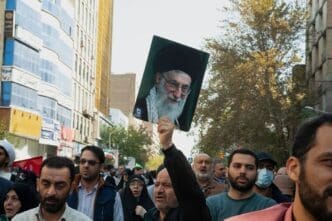Iran’s Supreme Leader Ayatollah Ali Khamenei has expressed his reservations regarding potential nuclear talks with the United States, describing such negotiations as neither “intelligent, wise, nor honorable.” This statement comes in response to former President Donald Trump’s proposal for nuclear negotiations with Tehran.
Khamenei’s recent comments have disrupted months of diplomatic overtures from Tehran toward the U.S., aimed at negotiating relief from substantial economic sanctions in exchange for curbing Iran’s rapidly advancing nuclear program. Although Khamenei advised against talks with the current U.S. administration, he stopped short of outright rejecting the possibility of such discussions.
These statements stand in stark contrast to Khamenei’s earlier remarks made in August, which appeared to favor dialogue. This highlights the tension within Iran’s political landscape as reformists, led by President Masoud Pezeshkian, advocate for engagement with Western powers, in opposition to conservative factions, including the paramilitary Revolutionary Guard, that remain skeptical.
Reflecting on the previous nuclear deal—voided by the U.S. under Trump’s administration—Khamenei pointed out that Iran fulfilled its obligations by significantly reducing uranium enrichment and stockpiles, only for the U.S. to abandon the accord unilaterally. “The Americans failed to honor their commitments,” Khamenei stated, emphasizing the lessons learned from that experience. “We made concessions, yet the other party ultimately violated the agreement.”
The timing of Khamenei’s declarations coincides with Trump’s recent assertions on social media, where he expressed a preference for a peace agreement that would allow Iran to “grow and prosper peacefully.” The former president denied exaggerated reports of potential military action against Iran, instead advocating for diplomatic efforts.
As Iran continues to enrich uranium to 60% purity—a technical step away from weapon-grade material—there is growing international concern about Iran’s nuclear intentions. Although Iran insists its nuclear ambitions are peaceful, the situation remains fraught, with suggestions that it could be positioning itself for a future nuclear capability.
The ongoing power dynamics within Iran’s bureaucratic structure, with Khamenei at its helm, reflect a complex interplay between various factions vying for influence over the nation’s foreign policy. The potential for more extensive inspections by the International Atomic Energy Agency, as hinted by President Pezeshkian, may offer a path forward.
Khamenei referenced the lessons learned from America’s unilateral withdrawal from the previous nuclear deal, emphasizing the need for cautious optimism in any future negotiations. Meanwhile, officials in Tehran continue to assert that their nuclear program is solely for peaceful purposes.
As discussions surrounding Iran’s nuclear program and potential dialogue with the United States remain uncertain, it is evident that both nations face significant diplomatic challenges. The balance between internal political pressures and international expectations will continue to shape the trajectory of Iran’s engagement with the global community.








